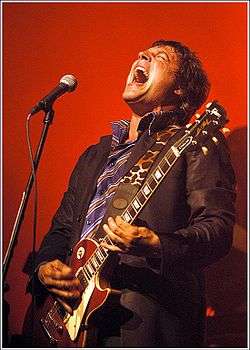Jean Leloup
| Jean Leloup | |
|---|---|
|
Jean Leloup | |
| Background information | |
| Also known as |
Jean Leclerc John the Wolf Massoud Al-Rachid Roi Ponpon |
| Born | May 14, 1961 |
| Origin | Sainte-Foy, Quebec, Canada |
| Genres | Rock |
| Occupation(s) | Singer-songwriter |
| Instruments | Vocals, guitar |
| Years active | 1989–present |
| Website | www.roiponpon.ca |
Jean Leclerc (born May 14, 1961) is a Québécois singer-songwriter and author from Sainte-Foy, Quebec, Canada. He is popularly known as Jean Leloup (which he likes to translate to John the Wolf), a stage name he kept using until 2006, when he temporarily changed his name to Jean Leclerc, only to resurrect his wolf character in August 2008. He is known for his colourful personality and unique musical style in the francophone rock community.
Biography

Born in Sainte-Foy, Quebec, Leclerc grew up in Togo and Algeria, where he was influenced by traditional African rhythms. He returned to Quebec in 1976, and appeared on the music scene in the 1980s, making waves with his provocative lyrics—in his song "1990", he compares the high-tech actions of Desert Storm to his sexual activities with his girlfriend.
Leclerc gain notoriety by winning the Festival de la Chanson de Granby, a singing contest, in 1983. Then, he played Ziggy in the famous musical Starmania, in 1986.
His first album, Menteur was released in 1989, but Leclerc immediately renied it, as he didn't like the final edits made by his label. The album helped him to gain notoriery in Quebec. The same year, Leloup played a small role in the TV serie Lance et compte.
His second album, L'amour est sans pitié, released in 1990 was a hit outside of Quebec, and was released in the rest of Canada, France, the Netherlands, Belgium and Japan.
A big touring with the band La Sale Affaire was provided across Quebec to promote the album.
After several years of concerts, Leclerc went in New York City to record his next album with his friend James Di Salvio, from Bran Van 3000. He explored many music genres, which led to the release of the breakthrough album Le Dôme.
He was the recipient of a Félix Award in 1997, following the success of his 1996 album Le Dôme.
His fourth album, Les Fourmis, which some tracks were recorded live, was released in 1998. Many of the tracks from the album were written in Togo, in Africa, during a trip.
Leloup also played in the Quebec movie Nô, from Robert Lepage.
After a hiatus, Leloup released his fifth album La Vallée des Réputations. More relax and folk than the others, Leloup won five Félix Awards with it.
Shortly after the release of the album, Leloup said in an interview that it was his last album.
At the end of 2003, Leclerc retired the name Jean Leloup and went on hiatus from his recording career. He worked as a music producer in 2004, as he produced and wrote some parts of the album Trashy Saloon from Anik Jean.
In August 2005, he announced his temporary return to the music scene with a collaboration with a band called the Porn Flakes. A first single called "Les Corneilles" has been heard on Quebec's radio stations.
In the months preceding his return, Leclerc wrote the philosophic novel Noir destin que le mien (originally entitled Le Tour du monde en complet); it was published October 5, 2005 at the Leméac editions under the pen name Massoud Al-Rachid.
Leclerc released the album Mexico in September 2006, his first under the name Jean Leclerc.
Jean Leclerc returned to the stage on August 29, 2008 for the 400th year of Quebec City's founding. He revived the name Jean Leloup for the occasion. The show was held at the Colisée Pepsi. The show created a controversy, as Leloup insulted the public during the concert, because he didn't like their energy. Although controversial, Jean Leclerc mentioned that the "last hour of the show was the best of his life".
Leclerc released the album Mille Excuses Milady (translated to "a thousand apologies, Milady") on April 28, 2009, under the name Jean Leloup and the first since he publicly declared that he wouldn't produce another album.
His recent album À Paradis City was a huge success in Quebec. The album is certified platinum. Leloup won 4 Félix Awards with it.
In 2016, Jean was nominated for a Juno Award for best album of the year.
Discography
- 1989: Menteur
- 1990: L'amour est sans pitié
- 1996: Le Dôme
- 1998: Les Fourmis
- 2002: La Vallée des réputations
- 2004: Exit (live album)
- 2005: Je joue de la guitare 1985–2003 (compilation)
- 2006: Mexico (as Jean Leclerc)
- 2009: Mille excuses Milady
- 2015: À Paradis City
Collaborations
- 1997: Glee (with Bran Van 3000)
- 2001: Discosis (with Bran Van 3000)
- 2011: The Last Assassins (with The Last Assassins)
See also
External links
- Jean Leclerc official website
|
